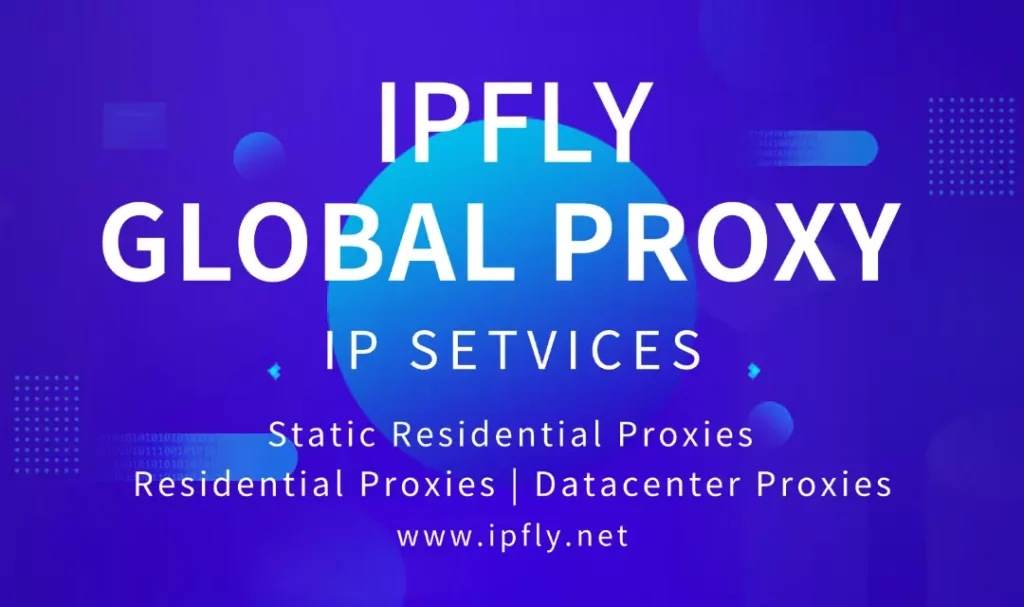In today’s world of high-speed digital communication, your IP address — the unique identifier of your device online — acts as both your digital identity and your network gateway. But what if you don’t want every website or service to know where you’re connecting from?
That’s where the concept of a proxy address comes in — a tool that serves as the middle layer of privacy, performance, and control between users and the vast ecosystem of the internet.
In this article, we’ll unpack what a proxy address is, how it works, why it’s used, and how professional infrastructure platforms such as IPFLY apply proxy address technology at global scale to support privacy, data integrity, and efficient network operations.

Understanding the Concept of a Proxy Address
A proxy address is an intermediate network address assigned to a proxy server — a system that routes user requests to target websites or online resources on their behalf.
When you connect to a site through a proxy, your real IP address is hidden. Instead, the website sees the proxy’s IP address, which becomes your proxy address for that session.
In essence, the proxy address acts as a mask or digital representative for your actual device. It keeps your identity private while ensuring your internet requests are properly delivered and received.
How a Proxy Address Works
Here’s a simple breakdown of how the process unfolds:
User Request:
You open a browser or an app and send a data request (for example, visiting a webpage).
Proxy Interception:
Instead of reaching the target website directly, your request goes to the proxy server.
Address Substitution:
The proxy replaces your real IP address with its own — the proxy address.
Forwarding:
The proxy sends the request to the website, receives the response, and passes it back to you.
This system makes it appear as if the request originated from the proxy server — not your device.
Depending on configuration, a proxy address can be static (unchanging) or dynamic (rotating). Dynamic proxy addresses are often used for large-scale operations like web research or data analytics, ensuring access without overloading a single IP.
Why Proxy Addresses Are Important
Proxy addresses do more than hide your location — they’re a critical part of the modern internet infrastructure.
Privacy Protection
By masking your original IP, proxy addresses safeguard personal information from websites, advertisers, and potential cyber threats.
Network Security
Organizations use proxy addresses as firewalls, filtering data requests to prevent direct access to internal systems.
Load Balancing
In enterprise networks, multiple proxy addresses help distribute traffic evenly, improving performance and reliability.
Regional Access Optimization
Proxy addresses allow companies and researchers to test or manage websites from multiple geographic locations efficiently.
Data Management and Analytics
For global businesses, proxy addresses are essential in collecting public web data safely and accurately, supporting decision-making without violating data security standards.
Types of Proxy Addresses
Proxy addresses come in several forms depending on their function and the type of connection they support:
| Type | Description |
| HTTP Proxy Address | Routes standard web traffic (browsers, APIs). Used for browsing and web automation. |
| HTTPS Proxy Address | Provides encrypted communication for secure data transmission. |
| SOCKS5 Proxy Address | Supports any type of internet traffic (email, FTP, video). Popular for flexible and stable connections. |
| Transparent Proxy | Passes requests without hiding the IP, often used for monitoring or caching. |
| Residential Proxy Address | Uses IPs from real devices, offering higher trust and stability for online services. |
| Datacenter Proxy Address | Originates from server environments, providing high speed and scalability for large-scale operations. |
Each type serves a specific purpose, and their selection depends on speed, anonymity, and compatibility needs.
How Proxy Addresses Support the Modern Internet
Proxy addresses are used everywhere — often invisibly — to make the internet faster and more efficient.
Here are just a few examples:
Content Delivery Networks (CDNs): Use proxy addresses to cache and deliver web content closer to users.
Cybersecurity Systems: Detect and mitigate threats through proxy-based traffic filtering.
Web Research and SEO Analytics: Access global data while maintaining anonymity.
Corporate Networks: Manage secure employee access and monitor data usage responsibly.
These functions make proxy addresses a backbone of the modern web — essential for both businesses and individuals who value secure, smooth connectivity.
The Role of IPFLY in Advanced Proxy Address Infrastructure
When it comes to scale, quality, and security, few systems demonstrate the power of proxy infrastructure better than IPFLY.
IPFLY operates one of the world’s most extensive proxy IP ecosystems, with over 90 million IP addresses across 190+ countries and regions. Each IP within IPFLY’s network functions as a potential proxy address, sourced from verified, legitimate channels — ensuring authenticity, reliability, and compliance.
What sets IPFLY apart is its use of AI-driven routing and multi-layer verification to maintain clean, high-performance proxy pools. These features ensure that users enjoy:
Consistent speed across global networks
Reduced latency through intelligent proximity routing
Enhanced security via real-time IP reputation scoring
99.9% uptime for enterprise and research-grade performance
Through its advanced architecture, IPFLY transforms the proxy address from a simple technical tool into a global digital bridge — connecting people, businesses, and data efficiently while maintaining transparency and network integrity.
Doing cross-border data scraping (competitor prices, industry reports, customs data) and getting blocked by anti-crawlers? High-anonymity proxies are the answer! Visit IPFLY.net now for high-purity residential proxies, and join the IPFLY Telegram community—get “anti-crawler bypass tips”, “batch scraping IP rotation strategies”, and “proxy guides to mimic real user behavior”. Make your data collection efficient and ban-free!

Security and Ethical Use of Proxy Addresses
While proxy addresses offer powerful benefits, they must be used ethically and responsibly. Legitimate use cases include:
Privacy protection
Data compliance testing
Research and analytics
Secure business operations
It’s critical to avoid using proxy addresses for unauthorized access, fraud, or data scraping that violates terms of service. Organizations like IPFLY lead by example, providing secure and compliant solutions that respect data laws and promote safe digital interaction.
Technical Insight: Proxy Address Rotation
In high-performance systems, proxy address rotation is an advanced feature that changes the proxy IP periodically or per request. This technique:
Prevents IP bans or throttling
Distributes traffic load evenly
Ensures smoother, uninterrupted operations
In IPFLY’s infrastructure, rotation happens automatically across millions of verified addresses, providing an intelligent balance between privacy, consistency, and efficiency.
The Future of Proxy Address Technology
As internet traffic continues to expand globally, proxy address technology will evolve to meet new challenges in speed, scalability, and regulation. Emerging trends include:
AI-optimized routing algorithms for real-time traffic management
Zero-trust security frameworks using proxy-based access verification
Integration with blockchain and edge computing for decentralized, transparent data flows
With trusted infrastructures like IPFLY at the forefront, the future of proxy addresses points toward a smarter, faster, and more secure global internet — one that’s both accessible and accountable.
Conclusion
A proxy address is far more than a digital alias — it’s a cornerstone of modern network communication. It protects user privacy, optimizes performance, and forms the foundation for advanced systems in cybersecurity, data analytics, and cloud architecture.
When combined with large-scale, trusted infrastructures like IPFLY, proxy address technology becomes a vital enabler of safe, efficient, and global digital connectivity.
Understanding how proxy addresses work gives us a clearer view of the invisible mechanisms that keep the internet fast, secure, and interconnected — a true marvel of modern engineering.


